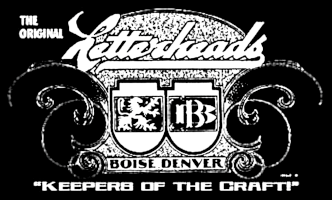Welcome to The Hand Lettering Forum!
This is an interactive Bulletin Board on the topics of Sign making, design, fabrication, History, old Books and of coarse Letterheads, Keepers of the craft. The Hand Lettering Forum features links to resources, sign art history, techniques, and artists profiles. Learn more about Letterheads at https://theletterheads.com. Below you'll see Mchat has been added as a live communication portal for trial, and the Main forum Links are listed below.
This is an interactive Bulletin Board on the topics of Sign making, design, fabrication, History, old Books and of coarse Letterheads, Keepers of the craft. The Hand Lettering Forum features links to resources, sign art history, techniques, and artists profiles. Learn more about Letterheads at https://theletterheads.com. Below you'll see Mchat has been added as a live communication portal for trial, and the Main forum Links are listed below.
HELP_Thinner Basics?
Moderators: Ron Percell, Mike Jackson, Danny Baronian
-
Aaron Aziz
- Posts: 36
- Joined: Sun Mar 25, 2012 2:08 am
- Location: North Dakota (eastern)
HELP_Thinner Basics?
I just picked up my first two hand lettering brushes Mack 179L and 189L both size 8. (big thanks to Christy at Hand Lettering Supply for her help!) I also have some 1shot paint, standard thinner and some liquen. So what do I need to know about using thinner and the basics of loading a brush. I have glass to practice on and lots of info on strokes and letter assembley, but I know nothing about oil paint and its use. Thanks!
-
Roderick Treece
- Posts: 1086
- Joined: Sat Apr 10, 2004 8:04 pm
- Location: San deigo Calif
- Contact:
Re: HELP_Thinner Basics?
I started sign painting when I was about 12 and I'm 57 now. For years I heard that certain habits caused blindness but so far i see fine so I say just load up the brush and START STROKING !
-
Mike Jackson
- Site Admin
- Posts: 1705
- Joined: Tue Apr 06, 2004 11:02 pm
- Location: Jackson Hole, WY
- Contact:
Re: HELP_Thinner Basics?
Hi Aaron,
Looks like you managed to get logged in. Welcome aboard.
It is difficult to explain exactly how much thinner you need at any particular time, but once you letter for a while, you just know!
Paint can feel gummy if too thick, which is okay on a rough brick wall, but in a gray quill, you need to thin it to let it flow off the brush.
Especially on glass, if you add too much thinner the bristles will wander all over he place. Too much thinner at any time can cause the paint to break down, not to mention being more transparent than it should be. In that respect, less is better than too much.
Kent Smith can probably come into this thread and give you some technical info, but the best advice anyone can give you is to just practice on all kinds of surfaces. And, not all thinners are the same quality. You can use the cheap stuff to clean your brushes, but I think most people would suggest a good grade of reducer for mixing with your paint as you letter. The last piece of advice I can give you here is to spend the extra bucks and get really good brushes.
Good luck,
Mike Jackson
Looks like you managed to get logged in. Welcome aboard.
It is difficult to explain exactly how much thinner you need at any particular time, but once you letter for a while, you just know!
Paint can feel gummy if too thick, which is okay on a rough brick wall, but in a gray quill, you need to thin it to let it flow off the brush.
Especially on glass, if you add too much thinner the bristles will wander all over he place. Too much thinner at any time can cause the paint to break down, not to mention being more transparent than it should be. In that respect, less is better than too much.
Kent Smith can probably come into this thread and give you some technical info, but the best advice anyone can give you is to just practice on all kinds of surfaces. And, not all thinners are the same quality. You can use the cheap stuff to clean your brushes, but I think most people would suggest a good grade of reducer for mixing with your paint as you letter. The last piece of advice I can give you here is to spend the extra bucks and get really good brushes.
Good luck,
Mike Jackson
Mike Jackson / co-administrator
Golden Era Studios
Vintage Ornamental Clip art
Jackson Hole, WY
Photography site:
Teton Images
Jackson Hole photography blog:
Best of the Tetons
Golden Era Studios
Vintage Ornamental Clip art
Jackson Hole, WY
Photography site:
Teton Images
Jackson Hole photography blog:
Best of the Tetons
 Denver Chapter of the Letterheads
Denver Chapter of the Letterheads